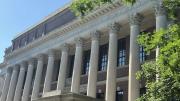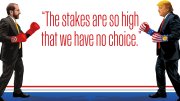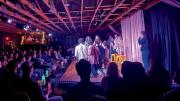As the COVID-19 pandemic rapidly escalates across the world, the United States economy has entered one of its most dramatic crises on record. In little more than a month, the Dow Jones Industrial Average has dropped by more than 32 percent from its peak, and service-sector workers, particularly those in the food-service, hospitality, and lodging industries, have begun to lose their jobs as businesses are forced to shutter.
Harvard Magazine asked professor of the practice of economics Karen Dynan—who has served as assistant secretary for economic policy and chief economist at the U.S. Treasury Department from 2014 to 2017, as well as on the staff of the Federal Reserve Board and the White House Council of Economic Advisers—about how to make sense of this crash. (Next month, Dynan will also be a guest on Harvard Magazine’s Ask a Harvard Professor podcast with her husband, Douglas Elmendorf, dean of the Harvard Kennedy School. The couple have also written a feature about the U.S. budget and federal fiscal policy—now on the verge of a trillion-dollar sea-change as the response to the crisis emerges— for the magazine’s forthcoming May-June issue.) She was interviewed by associate editor Marina Bolotnikova.
Marina Bolotnikova: Our current crisis is eliciting a lot of comparisons to 2008. For those of us who weren’t old enough to really understand what was happening then, how do you think this crash compares, in its impact on ordinary people and the speed with which it’s playing out?
Karen Dynan: First of all, there is no comparison between this economic crisis and any past crisis in terms of speed. In just a few weeks’ time, forecasters have gone from thinking this was going to be a pretty normal year for the global economy to expecting a mild slump to anticipating a sharp recession.
In terms of who is going to suffer the most, the current crisis is likely to be similar in some ways to 2008 and different in others. It’s generally the case that people in the lower part of the income distribution get hit harder in recessions. That was true in 2008, and that is going to be true in the current downswing. They’ll be the first to lose their jobs, and they tend to have limited savings to get them through hard times.
But the crisis is going to be different in other ways from the last one. The 2008 crisis had its roots in housing, and the much of the resulting hardship reflected that: homeowners suffered big declines in wealth and many lost their homes, lay-offs were particularly high in the housing and mortgage industries, and the worst-hit parts of the country were the ones that had experienced the largest home-price bubbles. The virus shutdowns are going to affect people in the service sector the most, such as workers in the travel industry, restaurant owners and employees, and people driving for rideshare companies.
In just a few weeks’ time, forecasters have gone from thinking this was going to be a pretty normal year for the global economy to anticipating a sharp recession.
COVID-19 is obviously the immediate cause of this crash. But are there other economic weaknesses beneath the surface that it’s exposing, and that will make it harder to recover even after the virus is contained?
The U.S. labor market was really strong going into the crisis, and that’s going to lessen the fallout. At the same time, the crisis is exposing weaknesses in our social safety net. For example, our unemployment insurance system will replace income for people who are laid off, but it’s not going to help people who are choosing not to work for fear of getting the virus, who can’t work because they need to take care of their school-age children, or who have no employer because they are working in the gig economy. To the extent these people are wiped out by the crisis, they aren’t going to be in a position to resume spending once the virus fears are behind us. And it has the potential to be self-reinforcing, because if businesses are not confident the demand is going to be there on the other side, they’ll be more likely to stop producing and reduce worker hours.
If you were in charge, how would you design the stimulus we need?
First of all, we are going to need to deploy significant fiscal stimulus rather than relying simply on central banks to ease financial conditions. And, we will need a lot of fiscal stimulus—I would suggest $1 trillion as a starting point. Part of the money should be aimed at helping the people and parts of the economy that are likely to suffer the most, such as expanding unemployment benefits, providing funding to states to support their healthcare systems, and providing loans to businesses that are at risk of failing. Another chunk of the money should be used for direct cash payments to households so as to generally support spending and foster confidence among businesses that demand will come back strongly so they’ll keep producing. And, most critically, we need to get the fiscal stimulus out quickly, before the economy suffers too much damage.
We will need a lot of fiscal stimulus—I would suggest $1 trillion as a starting point.
Since the Great Recession, the economy’s gains have been concentrated at the top of the wealth distribution. What does that mean for how this new recession (assuming we’re entering one) will affect regular people?
I don’t think the issue is so much what has happened in recent years as it is the decades-long trend of limited income growth for people in the middle and lower part of the distribution. It looks from the data like a lot of people have struggled to save and thus don’t have much in the way of financial buffers to carry them through a rough patch. Many people will get some assistance from the social safety net—but a lot could be facing big cutbacks in consumption. I worry, too, about people’s ability to make their student-loan and mortgage payments.
How will the imperative to revive the economy right now affect our long-term need to get on a path of decarbonization?
The focus on the economy is certainly going to distract us from formulating and legislating policies that will reduce carbon emissions and achieve decarbonization in other ways. The crisis and the policy response are also going to drive government debt higher than we previously anticipated. While higher debt shouldn’t rule out making government investments that encourage decarbonization (particularly, for example, if we are willing to pay for them by raising taxes), it is likely to make increases in any type of government investment more contentious.
The focus on the economy is certainly going to distract us from formulating and legislating policies that will reduce carbon emissions.
Do you think this crisis might permanently alter our society's consensus around the role of government in people's lives, the need for a generous safety net, etc.?
I hope so, but I don’t think we can count on it. It’s not just a matter of persuading people about the need for a more generous safety net, it’s a matter of demonstrating that our government is up to the task. That’s just another reason that the government needs to step up and take effective steps to reduce the economic harm associated with this crisis.









